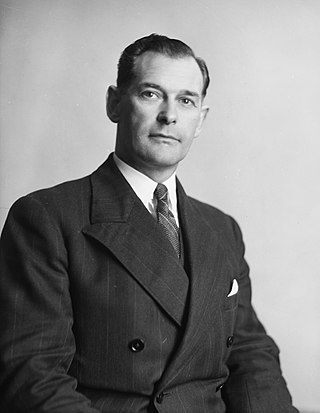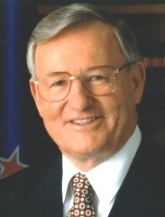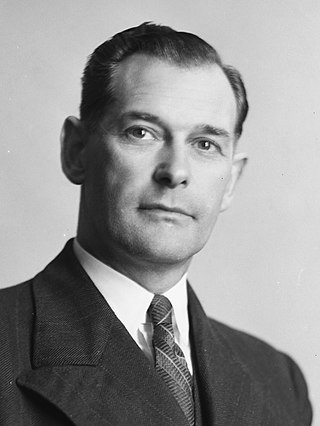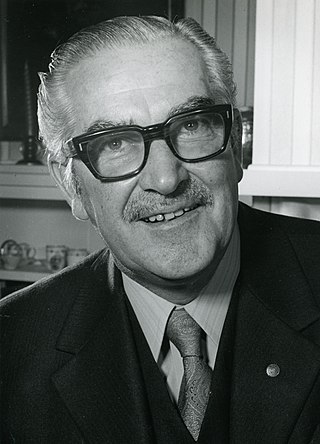
Sir Keith Jacka Holyoake, was a New Zealand politician who served as the 26th prime minister of New Zealand, serving for a brief period in 1957 and then from 1960 to 1972, and also as the 13th governor-general of New Zealand, serving from 1977 to 1980. He is the only New Zealand politician to have held both positions.

Sir Walter Nash was a New Zealand politician who served as the 27th prime minister of New Zealand in the Second Labour Government from 1957 to 1960. He is noted for his long period of political service, having been associated with the New Zealand Labour Party since its creation.

The 1990 New Zealand general election was held on 27 October to determine the composition of the 43rd New Zealand parliament. The governing Labour Party was defeated, ending its two terms in office. The National Party, led by Jim Bolger, won a landslide victory and formed the new government.

The 1978 New Zealand general election was a nationwide vote to elect the 39th New Zealand Parliament. It saw the governing National Party, led by Robert Muldoon, retain office, but the opposition Labour Party won the largest share of the vote. Reorganisation of the enrolment system caused major problems with the electoral rolls, which left a legacy of unreliable information about voting levels in this election.

The 1969 New Zealand general election was a nationwide vote to determine the shape of Parliament's 36th term. It saw the Second National Government headed by Prime Minister Keith Holyoake of the National Party win a fourth consecutive term. This is the most recent election where an incumbent government won a fourth term in office.

The 1954 New Zealand general election was a nationwide vote to determine the shape of the New Zealand Parliament's 31st term. It saw the governing National Party remain in office, but with a slightly reduced majority. It also saw the debut of the new Social Credit Party, which won more than eleven percent of the vote but failed to win a seat.

The 1963 New Zealand general election was a nationwide vote to determine the shape of New Zealand Parliament's 34th term. The results were almost identical to those of the previous election, and the governing National Party remained in office.
The Christchurch Central by-election of 1979 was a by-election during the 39th New Zealand Parliament. It was prompted by the death of Bruce Barclay, a Labour Party MP, and resulted in Geoffrey Palmer, also of the Labour Party, being elected to replace him for the seat of Christchurch Central. Palmer would eventually go on to become Prime Minister. The by-election was somewhat embarrassing for the National Party, whose candidate was pushed into third place by Social Credit's Terry Heffernan.

The Second National Government of New Zealand was the government of New Zealand from 1960 to 1972. It was a conservative government which sought mainly to preserve the economic prosperity and general stability of the early 1960s. It was one of New Zealand's longest-serving governments.

John Baldwin Munro, better known as J. B. Munro, was a New Zealand politician of the Labour Party. He was also a notable disability advocate.

John Gerald O’Brien, known as Gerald O'Brien, was a New Zealand politician of the Labour Party.

Trevor James Young was a New Zealand politician of the Labour Party.
Hutt was a New Zealand parliamentary electorate. It was one of the original electorates in 1853 and existed during two periods until 1978. It was represented by 13 Members of Parliament.

Sir John Kennedy-Good was a New Zealand politician. He was mayor of Lower Hutt from 1970 to 1986.
The 1967 Petone by-election was a by-election for the electorate of Petone on 15 April 1967 during the 35th New Zealand Parliament. The by-election resulted from the death of the previous member the Hon Mick Moohan on 7 February 1967. The by-election was won by Fraser Colman, also of the Labour Party.
The Grey Lynn by-election 1963 was a by-election held in the Grey Lynn electorate in Auckland during the term of the 33rd New Zealand Parliament, on 18 May 1963.

The Hamilton by-election 1959 was a by-election held in the Hamilton electorate in Hamilton in the Waikato during the term of the 32nd New Zealand Parliament, on 2 May 1959.

The Hutt by-election was a by-election in the New Zealand electorate of Hutt, an urban seat at the bottom of the North Island. The by-election was held on 18 December 1929, and was precipitated by the resignation of sitting United member of parliament Thomas Wilford on who had been appointed the High Commissioner to the United Kingdom by Prime Minister Joseph Ward. The by-election was contested by Walter Nash of the Labour Party, James Kerr from the United Party and Harold Johnston of the Reform Party. The lead up to the by-election was marred by harsh words between candidates.

The 1951 New Zealand Labour Party leadership election was held on 17 January to choose the fifth leader of the New Zealand Labour Party. The election was won by Hutt MP and incumbent deputy-leader Walter Nash.

Virginia Ruby Andersen is a New Zealand politician. She has been a Member of Parliament in the House of Representatives for the Labour Party since the 2017 New Zealand general election.
















